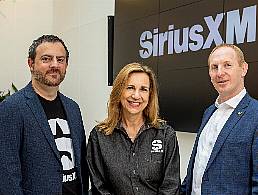Priced out of Dublin? Belfast has become a major sci-tech hub on the island of Ireland and it’s catching up to the capital fast.
While Dublin has Silicon Docks, it also has accommodation prices as high as the cranes that signal its economic growth.
Most in Ireland will admit that the boom is back, and while Dublin (and Ireland as a whole) has quickly become one of the sci-tech capitals of the world, the accommodation crisis is causing major problems for attracting and retaining talent. Luckily, there are other places for tech workers.
This month, we’re taking a closer look at the Northern Irish capital of Belfast.
“I think Belfast is about five years behind Dublin but it’s catching up,” said Andrew Maybin, as he told me about the city’s sci-tech ecosystem. Maybin is the managing director of Tibus, a hosting and streaming service based in Belfast.
He noted the level of tech meet-ups and coding events in the city, which had increased from approximately five in 2012 to more than 40 now, and that’s just the ones he and his colleagues could think of.
Despite the current political situation, Belfast is a world away from the troubled city of two decades ago. The start-up scene is gathering momentum all the time and the job opportunities, particularly in the sci-tech sphere, are phenomenal.
You only need to look at the last month to see more than 80 jobs announced for the Northern Ireland capital, between Flint Studios, Made to Engage and Ammeon.
Some of the top fintech, innovation and tech companies have set up shop in Belfast, including Allstate, Citigroup and BT Ireland, which set up a £28m research hub in the city last year.
Planes, trains and automobiles
Belfast has always been considered a central hub for aerospace engineering and shipbuilding. After all, it’s where the world-famous Titanic was built.
In the aerospace sphere, the city recently celebrated a trade battle victory between Bombardier and Boeing, saving thousands of jobs at the former’s Belfast factory. According to The Irish Times, Bombardier is now “generating cash at the healthiest clip in seven years”.
It also looks like Belfast could thrive in the autotech industry. TechWatch editor Emily McDaid recently spoke to Richard Kirk of the Institution of Civil Engineers to find out more about the Belfast’s prospects as a futuristic city.
Belfast now has the highest density of fibre in Europe. Its connectivity goes beyond broadband. Good air and rail connections link it to Dublin, London and further afield.
The Belfast start-up scene
While Belfast arguably doesn’t have an identifiable start-up quarter, to say its start-up scene isn’t thriving would be extremely remiss.
Of course, Invest NI is there to offer support to early-stage start-ups. However, there are other avenues for start-ups within the city.
Catalyst Inc is a not-for-profit organisation that invests the surplus generated from agile workspaces and facilities into Connect, a community-led ecosystem that supports more than 600 science, technology and innovation entrepreneurs in Northern Ireland. More than 3,000 engineers, researchers, entrepreneurs and executives work at the Catalyst Inc campuses.
Additionally, a collaborative co-working space for the tech community launched in 2017 in the Ormeau Baths, a Victorian-era listed building that has been brought back to life.
City of cybersecurity
Belfast is fast becoming a cybersecurity hub within the UK. Queen’s University Belfast (QUB) is home to The Centre for Secure Information Technologies, one of only seven UK Innovation and Knowledge Centres.
Late last year, QUB announced that it would launch a £5m research institute to help improve hardware security. It is one of four cybersecurity institutes in the UK, and is expected to be a global hub for research and innovation in hardware security over the next five years.
Belfast is also home to a number of leading cybersecurity and infosec firms, including Proofpoint, Anomali, Alert Logic and Whitehat, to name but a few. Belfast also played host to two global cybersecurity conferences last year.
The Industrial Strategy for Northern Ireland published at the beginning of 2017 estimated that the cybersecurity sector grew by 30pc in 2016. The report also forecast that Belfast will become a global innovation hub for cybersecurity, supporting more than 5,000 jobs.
While Belfast is definitely behind Dublin, it certainly is catching up. In the meantime, that small lag can be a notable advantage when it comes to attracting talent. The cost of living is lower and the room to grow gives way to plenty of exciting opportunities for those considering relocating to Northern Ireland’s capital.
Disclosure: Tibus provides web hosting infrastructure for Siliconrepublic.com
Want stories like this and more direct to your inbox? Sign up for Tech Trends, Silicon Republic’s weekly digest of need-to-know tech news.




